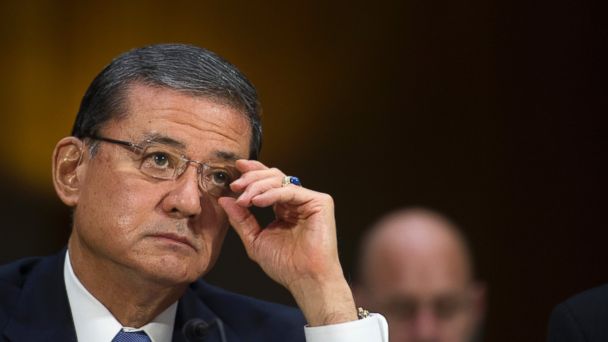Shinseki Meets With Veterans Groups, No Sign of Resigning
One day after the bombshell interim Inspector General report showing "secret waiting lists" as a Phoenix veterans hospital, Veterans Affairs Secretary Eric Shinseki met with leading veteran service organizations today.
The embattled secretary, who faces an ever-growing list of lawmakers asking for his resignation, showed no signs he has any plans to leave anytime soon, despite a growing outcry fueled by the report, which showed that as many as 1,700 veterans in need of care were "at risk of being lost or forgotten" by not being placed on the official waiting list.
"At the end of the day, he's used to be shot at and blown up, so this doesn't distract him too much," Derek Bennett, chief of staff for the Iraq and Afghanistan Veterans Association told ABC News' Jonathan Karl following today's meeting. "The man has served almost five decades for this country, lost half a foot in Vietnam. The clamor of the Congress doesn't distract him very much."
"This is not a guy that runs away from problems," Bennett added. "He did not give any indication that he wants to resign. He gave every indication that he wanted to carry the ball down the field and resolve the problem."

(Cliff Owen/AP Photo)
The meeting, which took place at the VA in Washington, D.C., included 15 organization leaders and focused on the interim report and how to fix the problem.
"He's certainly upset and feels there's been a breach of integrity," Bennett said. "He recognizes the Department of Veterans Affairs has lost some of the confidence among veterans and he wants to change that."
According to Roscoe Butler, assistant director for healthcare with the American Legion, the organization that earlier this month called for Shinseki's resignation, told ABC News he walked away with a "sense of confidence," but the group is standing by its demand for Shinseki to step down.
"The secretary seemed to be very sincere and serious about looking into these systemic problems," Butler said, adding that they were told "within the next 24 hours" the secretary will be releasing his "accountability action" plan for next steps.
"I am walking away with a sense of confidence that the senior leaders for VA that were in attendance at the meeting are looking at this very seriously, they're taking this very seriously, and they're doing the right thing to take the appropriate action necessary to address this systemic issue," Butler said.
The interim report confirmed inappropriate scheduling practices are "systemic" throughout the Veterans Health Administration, and the Inspector General announced the office is deploying "rapid response teams" to 42 VA medical facilities to investigate allegations of misconduct - giving them no warning of their arrival.
At the meeting, Shinseki announced "he's directed the VHA to contact the 1,700 veterans waiting for health care appointments at that facility" and outlined "what the VA will do implement the IG's four recommendations and finish the VA's internal audit of scheduling policies," according to the VA.
However, Bennett said the responsibility to fix the issue ultimately lands back in President Obama's lap.
Obama, both as a candidate and during his first term as president, promised to reform the VA, but "we haven't seen any of that happen." Bennett said. "So this is the president's responsibility at this point. He sends men and women into combat. We also have to make sure we take care of them when they come home."